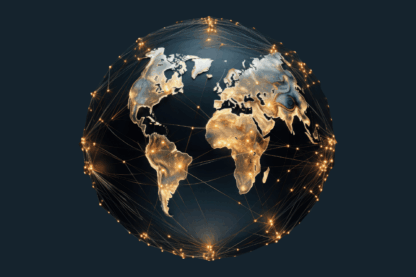AI’s reach is broader than any recent tech wave, and Bain & Company’s “Technology Report 2025: AI Leaders Are Extending Their Edge” examines how artificial intelligence is transforming industries and power structures with a scale and velocity unseen in recent decades. Authored by David Crawford, Anne Hoecker, and Dana Aulanier, the report underscores the defining truth of our era: those already leading with AI are accelerating ahead. At the same time, those waiting to adapt are being left behind.
The analysis, grounded in extensive market data and executive interviews, delves into the dynamics shaping value creation, the evolution of sovereign technology strategies, and the emergence of agentic AI systems capable of executing entire workflows autonomously. For luxury industry leaders, the findings hold particular resonance. The technology shifts Bain describes are not confined to Silicon Valley; they will directly influence design, production, retail experiences, and sustainability across the world’s most exclusive sectors.
AI as the Great Divider
Bain identifies artificial intelligence as the decade’s defining disruptor. Unlike past technology waves, AI extends across every layer of enterprise and governance, reshaping trade, security, and culture.
- By mid-decade, AI leaders were already improving profitability by 10% to 25%.
- The introduction of agentic AI systems marks a new phase: machines capable of acting independently, optimizing operations, and redefining productivity.
- For those still “piloting,” Bain warns, the gap is growing insurmountable.
Value Evolution: Winners, Challengers, and the Shifting Stack
The report observes that dominant technology firms (Amazon, Microsoft, Alphabet, Apple, Meta, and Nvidia) continue to hold extraordinary market power, collectively representing over 70% of total sector value. Yet, Bain notes that new contenders are gaining ground:
- OpenAI now commands an estimated $300 billion valuation.
- Other AI companies like Glean, Anthropic, Mistral, and Anysphere are pioneering and have huge valuations
- Competition now extends beyond software into infrastructure, devices, and even search, where AI-driven platforms are beginning to replace traditional engines.
For luxury brands, this democratization of intelligence means opportunity. Smaller, agile players, provided they can access advanced models and data, may soon compete with global platforms on personalization, prediction, and creative innovation.
Sovereign Tech and the Fragmented World
Bain’s analysis situates AI within a rapidly fragmenting geopolitical context. Governments, wary of dependence on foreign technology, are investing heavily in sovereign AI: national systems built on local data and cultural frameworks.
Key insights include:
- China has invested over $250 billion in semiconductor capacity, producing nearly 20% of the world’s logic chips.
- Europe’s €200 billion InvestAI initiative aims to create “AI gigafactories,”
- Saudi Arabia’s new AI firm, Humain, plans to build domestic data centers with a combined capacity of 500 megawatts.
For luxury brands with global operations, this means navigating a patchwork of digital sovereignties, adapting personalization models, customer data practices, and AI systems to comply with regional expectations of transparency and ethics.
Investment and Value Creation in a Mature Market
Future value will rely on operational excellence and AI-driven efficiency rather than simple market growth.
Key Bain takeaways for investors include:
- Revenue growth has historically accounted for 53% of tech investment returns, but saturation and competition are tightening margins.
- AI will become the primary engine of differentiation, powering personalized offerings, predictive analytics, and value-based pricing.
- Commercial excellence, including new pricing models and data monetization, will define the next generation of winners.

Strategic Battlegrounds: The Rise of Agentic AI
A core section of the report, Will Agentic AI Disrupt SaaS?, examines how AI agents are transforming software and services by performing full processes autonomously. Bain predicts that:
- In three years, many routine digital tasks will shift from “human plus app” to “AI agent plus API.”
- SaaS providers and enterprise platforms must pivot from seat-based pricing to outcome-based pricing, reflecting the tangible value created by AI systems.
- Control over data will determine power. Proprietary information, not model ownership, will become the true source of competitive strength.
Luxury companies, particularly those in retail and hospitality, can interpret this as a signal to integrate intelligent systems that not only assist but anticipate consumer behavior, optimizing every touchpoint from atelier to boutique.
Meeting AI’s Insatiable Demand for Power
AI’s computational appetite, Bain warns, is outpacing Moore’s Law by a factor of two. Global compute demand could reach 200 gigawatts by 2030, requiring $500 billion in annual infrastructure investment.
- Even if corporations reinvest all AI-driven savings, the funding gap could exceed $800 billion annually.
- Algorithmic innovation, quantum computing, and new chip architectures may alleviate some pressure, but power shortages remain a real constraint.
This is especially relevant to luxury real estate and hospitality developers, whose future projects may integrate AI-driven systems for design, sustainability, and service automation. Understanding the infrastructure realities behind these technologies is essential for strategic investment.
Humanoid Robots: From Spectacle to Function
Finally, Bain addresses the surge in humanoid robotics. While public fascination grows, practical deployment remains limited to structured environments such as logistics and manufacturing.
- Intelligence and perception capabilities are advancing rapidly, approaching human levels within three years.
- However, dexterity and battery life remain limiting factors; true autonomy may be a decade away.
- Early adopters, Bain suggests, should pilot now to understand integration challenges, safety protocols, and workforce dynamics.
Luxury manufacturers and hospitality groups may see early value in hybrid humanoid applications, precision assembly, concierge services, or warehousing, where design and experience intersect with automation.
WLCC Perspective: It is essential that luxury brands integrate AI thoughtfully to transform every touchpoint, turning data into artistry and foresight into competitive edge.
Explore the complete 2025 technology report here: https://www.bain.com/insights/topics/technology-report/
Stay up to date on the latest luxury industry news: https://worldluxurychamber.com/insights-news/





